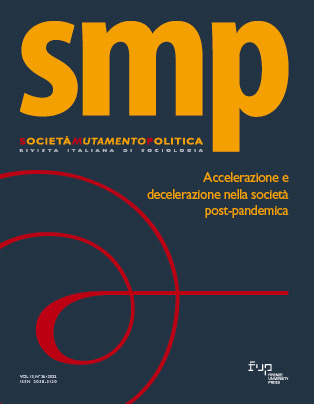Published 2023-03-24
Keywords
- Covid-19,
- time,
- boredom,
- people,
- university students
How to Cite
Copyright (c) 2023 Ilaria Pitti

This work is licensed under a Creative Commons Attribution 4.0 International License.
Abstract
Discussing the results of a qualitative research conducted with Italian university students (19-27 years), the article analyses young people’s time management strategies during the first year of the Covid-19 pandemic. The research highlights how the forced deceleration imposed by anti-Covid policies has rarely translated into a conscious “practice of the present” (Sloterdijk 2007). Rather, young people’s experience of the time during the pandemic is marked by a strong projection towards the future – expressed through compulsive practices of programming, planning and accumulation of skills (Rosa 2013) – and regression in the past – noticeable in the return to childhood practices, interests, and behaviors. The article reflects on the potential consequences produced by the combination of these two apparently antithetical dynamics in terms of a “leap” of the biographical time of youth.

